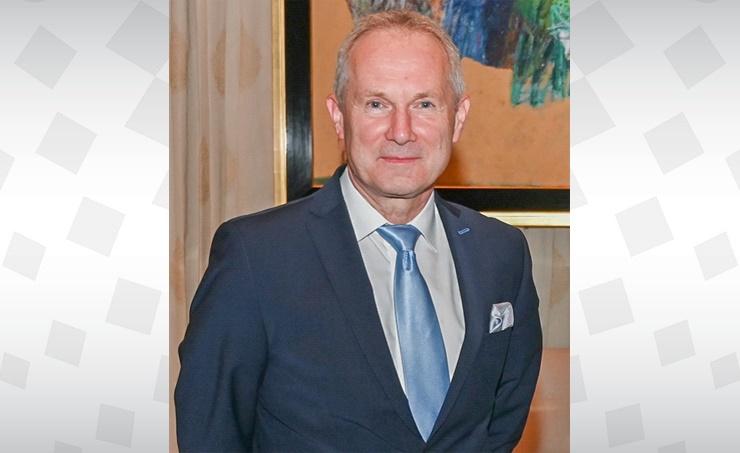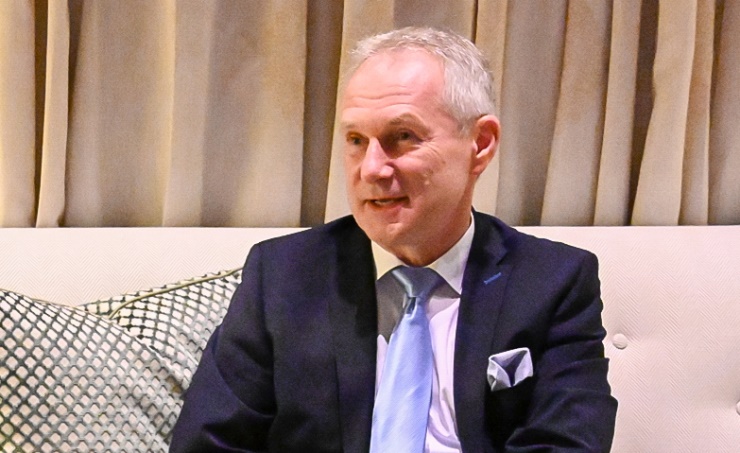Manama : Bahrain is one of the most constructive actors in the United Nations General Assembly (UNGA), said the 77th UNGA President Csaba Kőrösi, noting its large influence because of its diplomacy and approach.
Countries who can embrace a vision for themselves, for their development, for their place in the larger broader world, those countries are the most successful ones, Kőrösi said in a joint interview with Bahrain News Agency (BNA) and Bahrain Television during his visit to Bahrain where he met with His Majesty King Hamad bin Isa Al Khalifa and top officials.
“Bahrain is a lucky country, because what I saw in the vision of Bahrain is a very well formed strategy for the future,” he said.
“And when I had the chance to have a discussion with His Majesty King Hamad, I found that he is a man with vision. So, it’s always very reassuring that even in times of wars, in time of financial crises, in time of climate crisis, there are leaders in the world who take the responsibility.”
Speaking on the purpose of his visit, which is the first to a Middle Eastern country, Kőrösi said he sought to build alliances and cooperation with Bahrain.
“The world is in crisis,” he said. “It’s the most complex, most difficult crisis the world is going through for the last 70 years.”
The UNGA President said his meetings with His Majesty the King and government officials discussed means of helping member states weather the current crisis and to make progress in sustainability transformation and to get prepared for the challenges that are waiting further down the road.
“My other purpose for coming here was to see by my eyes what I saw from the books and different reports; that it is possible, even in a small country where various diverse communities, either religious or ethnic communities, can live, work and thrive together,” he said.
“I saw very nice examples. I wish many leaders could be given the same tour I had the chance to participate in.”
Kőrösi also met with young Bahraini diplomats to discuss how they view the world and how their knowledge is up to date on future challenges.
On cooperation between Bahrain and the UN, the UNGA President said Bahrain was a valued and very highly cherished partner of the United Nations.
Bahrain is a regional hub for the United Nations, he said, adding there were more than 20 UN agencies based here to serve the broader region.
He recounted that Bahrain was a non permanent member of the UN Security Council and the Human Rights Council.
The UNGA President said that Bahrain was a very generous country in supporting humanitarian efforts, noting that it coordinates with the UN on all humanitarian activities that are conducted abroad.
Kőrösi was the co-chair of the UN negotiations that produced the Sustainable Development Goals (SDGs).
“When I gathered down the results of the long negotiations that produced the 17 goals” he said. “I was very hopeful because we felt that it is something serious for the whole humanity, for the future. But I still had some doubts, how will it come down to different countries?”
He said he was positively surprised to see that progress has been made in this area in Bahrain, adding that it was one of the first countries to have a ministry for sustainable development.
In addition to the administrative unit, he said it was reassuring to see how Bahrain made efforts into aligning policies and allocating budgets to drive the sustainability transformation process.
Kőrösi said the SDGs were a global vision, not a national one.
No one can implement the global vision, it needs to be translated into national realities, he said.
Bahrain has done its job, he added, explaining that it distilled the 17 goals for its realities, according to its needs, priorities, traditions, and social structure, and started a mechanism to turn the goals into a national development programme.
Bahrain has integrated SDGs into its Government Action Plans and aligned its efforts to implement them with its Economic Vision 2030.
The UNGA President said he wished Bahrain shared its experience with other countries.
He said that countries that could internalise SDGs, make them their own and design a national programme for them and finance it; are the most successful ones today.
“Changes are happening with us, or without us,” he said. “The big question: Would we like to be masters of the change, or we would like to be victims of the change?”
The interview with the UNGA President also shed light on the King Hamad Youth Empowerment Award to Achieve the SDGs and the Princess Sabeeka bint Ibrahim Al-Khalifa Global Award for Women’s Empowerment.
He said he discussed these two awards with His Majesty the King and Foreign Affairs Minister, Dr. Abdul Latif bin Rashid Al Zayani.
“I sincerely hope that these awards could be turned into some kind of international awards under a UN umbrella” he said. “And if there is an intention on the side of the Government of Bahrain, to approach the United Nations to make it a kind of UN affiliated award, I’d be very happy to lend my support to this endeavour.”
Kőrösi said that efforts to support youth and empower women are strategically important for all societies.

“We have to make sure that 100% of the societies, each and every member, should be given the chance to develop his or her full capacities” he said. “We cannot afford to leave behind half of the population.”
The UNGA president said that any efforts made in terms of transformation will be determining the fate of not only this generation, but even more the generations to come.
“So, it’s about our children and our grandchildren. If we want them to be on board, we have to involve them.”
Kőrösi commended the progress made by women in the Kingdom of Bahrain, which was reflected in Bahrain’s rankings in the Human Development Index (HDI).
He noted that the second day of his visit to Bahrain started with three meetings with women leaders; the Sustainable Development Minister, the Supreme Council for Women Secretary General and the Mohammed bin Mubarak Al Khalifa Academy for Diplomatic Studies (MBMA) Director General.
“Within the social structure, the education of girls and women is at least on that level as men, in the government sector you have a majority of women working,” he said.
“So, in terms of legal regulations, I think we have done what we had to, now the implementation is going on.”
The 77th UNGA President noted that Shaikha Haya bint Rashid Al Khalifa from Bahrain was the third out of only four women to serve as UNGA President.
“She was a very successful president of the General Assembly, particularly when you have a time of crisis” he said describing the tenure of the 61st UNGA President.
“Women in many cases, approach crisis situations with a more empathetic manner. They are somehow more sensitive to finding more complex solutions.”
Commenting on the importance of the meeting of the Council of Presidents of the United Nations General Assembly (UNCPGA) held in Bahrain last March, Kőrösi said the outcome of the meeting will reflect in the form of resolutions coming from the General Assembly.
He also expressed his gratitude for the initiative launched by His Majesty the King and his offer of support towards the establishment of a foundation to support the work of the Council.
“When you have very complex situations you need to find integrated solutions. It requires knowledge. It requires experience. It requires scientific evidence. What the former presidents of the General Assembly can offer is a kind of vast experience which does not exist in any other part of the United Nations.”
Speaking on the opportunities and challenges during his tenure as president of the UNGA, Kőrösi said there were many goals, agreements and legal accords; but more action had to be taken in terms of implementation.
“It is crisis time, and crisis can only be overcome if we go for action through solidarity, sustainability and science,” he said. The motto of the 77th UNGA Presidency is “Solutions through solidarity, sustainability and science”.
The UNGA President said differences and inequalities in the world were growing, and that could lead to a polarised and unjust world.
“Therefore, in my understanding, solidarity now is more important than ever. If more than one billion people are not having enough food for sustaining themselves. It’s a tragic situation. Humanity cannot afford that.”
He added: “If there are still more than 200 million people who are fleeing from conflicts, they are trying to find their place under the sun. If there are more than 2 billion people in the world, who have no access to safe drinking water in their daily lives. If a very significant part of children in developing countries are falling out of schools much earlier than they would like to have to. If in many countries, we are losing still way too many children before the age of five, these inequalities cannot be sustained. We should change.”
The UNGA President stressed the need to make a transformation, outlining challenges that face the world in terms of climate change.
“These are the issues that will determine our future chances for life on earth” he said. “So, we have to make a sustainable transformation. That’s what the 17 sustainable development goals have been created for.”
He highlighted the importance of science in resolving these challenges and finding political common ground to enable it to make a difference.
“We have to come together, that common ground should be found and brought, and in my understanding that common ground could be based on scientific evidence,” he said.
“If we take it all together, you may call it a program of transformation,” he added, recognising that this course of action will exceed his time as UNGA President.
“But as far as I see, the reaction of the number of states including that of Bahrain or those who have responsibility for the future, many of these points resonate with the governments. And I am very grateful for those governments who try to act responsibly and act in the name of humanity.”


